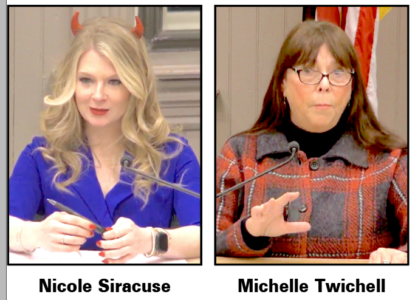Goodell votes no on legal pot bill signed into law
State Assemblyman Andrew Goodell, R-Jamestown, didn’t come out against legal marijuana sales, but is voicing his concerns over aspects of the Marijuana Regulation and Taxation Act.
The legislation (A.1248) passed the Assembly late Tuesday in a 94-56 vote. Goodell and Assemblyman Joe Giglio, R-Gowanda, voted against the Assembly legislation while Sen. George Borrello, R-Sunset Bay, voted against the legislation in the state Senate. It was signed by Gov. Andrew Cuomo early Wednesday.
Goodell said he agreed with Assembly members who decried unequal enforcement of the state’s marijuana possession and sales laws over the past several decades, but said the way to deal with those issues is to focus on making enforcement equal. Goodell specifically took issue with two of the bill’s purposes — to decrease illegal sales, the legislation’s inclusion of delivery services and its stated aim to protect youth.
Like many Republicans, Goodell argued that the taxes and fees included in the Marijuana Regulation and Taxation Act means legal sales will be much more expensive than illegal sales.
“Every other state that has legalized recreational marijuana has seen the black market explode,” Goodell said. “It’s uncontroverted. Why has it exploded? It’s simple economics, isn’t it? The black market, you don’t pay the sales tax of 13%, you don’t pay the THC tax, you don’t pay the annual filing fees. They don’t pay any of those expenses. If you’re in the black market you don’t pay income taxes. They don’t pay any taxes. If you’re in the black market you don’t have to waste money on marketing — we’ll let legal guys do that. They don’t need to waste money on testing for purity. So you can sell your product for a lot less and this legislation makes it a lot easier by reducing all the criminal sanctions for the black market to thrive. So a black market is going to thrive with this.”
Goodell took aim also at the legislation’s provisions for exemptions for those who sell to minors if the seller is less than three years older than the youth who buys the illegal marijuana, the authorization of delivery services that make it difficult to tell if someone is getting their marijuana legally or not, a lack of increased penalties for those who sell marijuana illegally to youth, lack of decreased marijuana potency regulations for minors and the expansion of youthful offender provisions for minors who are caught selling marijuana illegally. Goodell also discussed the requirement that some seats on the Cannabis Advisory Board be reserved for those who have violated the state’s drug laws in the past. Among the drug law violations that don’t disqualify Cannabis Advisory Board members are criminal sale of a controlled substance near a school, using a child to effectuate sale of a controlled substance and unlawful manufacture of methamphetamine.
“There’s one other quirky thing about this law — and keep in mind as legislators we vote on the law, we don’t vote on concept. We vote on the law. What’s unique about this law that I’ve never seen is that we’ve put criminals in charge of the system. Think about that concept for a minute. If you apply for a liquor license and you violate the liquor law, you’re not eligible. But under this bill one of the requirements to be on the Cannabis Advisory Board is that you are a convicted felon, that you were incarcerated, that you violated the law. It’s a requirement. By the way, there’s no requirement for any appointment of a Republican or the minority. But there’s a requirement that some of the members actually have been incarcerated for violating the drug laws and we’re putting them on the advisory board. This bill also says that the fact you’re been convicted, sentenced and incarcerated for a drug offense does not disqualify you from getting a license.”
Local governments could opt out of retail sales. New York would set a 9% sales tax on cannabis, plus an additional 4% tax split between the county and local government. It would also impose an additional tax based on the level of THC, the active ingredient in marijuana, ranging from 0.5 cents per milligram for flower to 3 cents per milligram for edibles. The legislation would take effect immediately if passed, though sales wouldn’t start until New York sets up regulations and a proposed cannabis board. Assembly Majority Leader Crystal Peoples-Stokes has estimated it could take 18 months to two years for sales to start. New York is the 16th state to legalize marijuana sales to adults and the third state where lawmakers, rather than voters, have approved legalization.
A new state Cannabis Control Board, with the assistance of the chief equity officer and advisory board, will also be required to establish a social equity plan. The goal of this plan will be to issue 50% percent of licenses to social equity applicants, especially those impacted by the war on drugs, those who are low-income, those who have a marijuana-related conviction, as well as minority and women owned businesses (MWBEs), distressed farmers and service disabled veterans. Much of the revenue from the legalization of adult-use marijuana will go to the Community Grants Reinvestment Fund, which will be administered by the Office of Cannabis Management advisory board and allocated to community based nonprofits to reinvest in communities disproportionately impacted by state and federal drug laws, as well as providing substance use disorder services, mental health services, services to address adverse childhood experiences, and afterschool and child care services. It will also support education through the state Lottery Fund and the Drug Treatment and Public Education Fund, which would require the Department of Health and Office of Addiction Services and Supports to establish substance use disorder treatment programs for youth and adults.
Still, Goodell said the bill’s positive do not outweigh the negatives, in his opinion.
“My friends, let’s be clear — none of us here in this chamber or listening by Zoom or anywhere else support discriminatory enforcement,” Goodell said. “Every one of us is concerned and cares deeply about our school children and their health and safety. Every one of us is concerned deeply about the safety of our highways and every one of us wants to reduce the illegal sale or recreational drugs in New York state. We all share that purpose. The question before us tonight is whether this legislation — which removes the criminal sanctions on illegal sales, which imposes huge costs on a legal sale, that decreases all the criminal sanctions on the sale to children, provides special exemptions if you want to sell to children if you’re not that much older — do these provisions advance our objectives? In my opinion they do not and therefore I will be recommending against this bill.”




